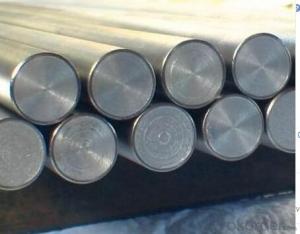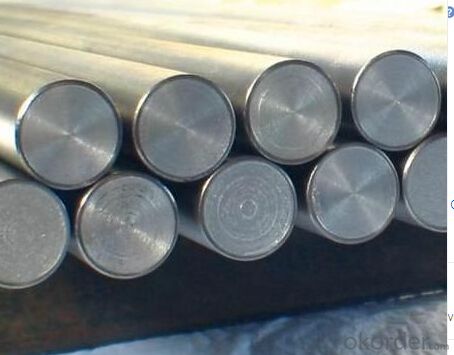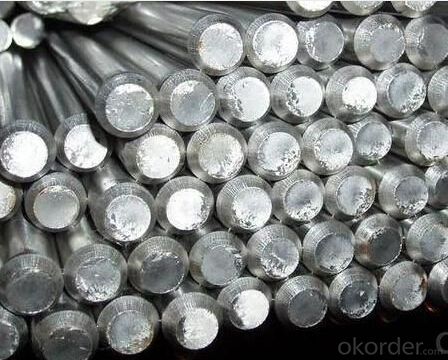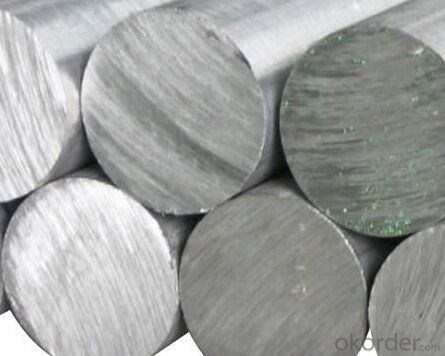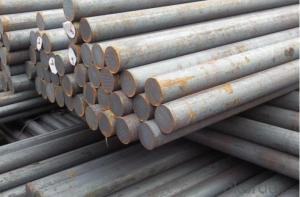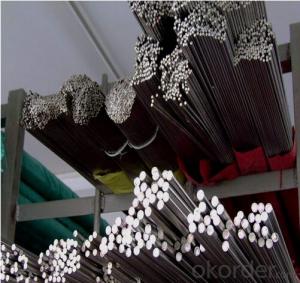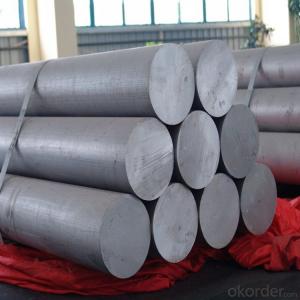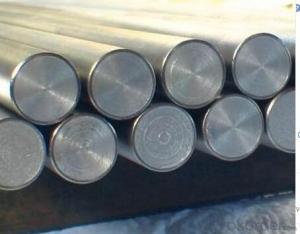High Heavy and High Quality Bearing Steel GCr15
- Loading Port:
- China Main Port
- Payment Terms:
- TT or LC
- Min Order Qty:
- -
- Supply Capability:
- -
OKorder Service Pledge
OKorder Financial Service
You Might Also Like
Product Description:
OKorder is offering High Heavy and High Quality Bearing Steel GCr15 at great prices with worldwide shipping. Our supplier is a world-class manufacturer of steel, with our products utilized the world over. OKorder annually supplies products to European, North American and Asian markets. We provide quotations within 24 hours of receiving an inquiry and guarantee competitive prices.
Product Applications:
High Heavy and High Quality Bearing Steel GCr15 are ideal for structural applications and are widely used in the construction of buildings and bridges, and the manufacturing, petrochemical, and transportation industries.
Product Advantages:
OKorder's High Heavy and High Quality Bearing Steel GCr15 are durable, strong, and resist corrosion.
Main Product Features:
· Premium quality
· Prompt delivery & seaworthy packing (30 days after receiving deposit)
· Corrosion resistance
· Can be recycled and reused
· Mill test certification
· Professional Service
· Competitive pricing
Specifications of High Heavy and High Quality Bearing Steel GCr15
1. Dimensional sizes: Thickness: 14~100mm.Length:3000~5800mm,Diameter :14-500mm
2.Chemical composition:
C | Si | Mn | Cr | Ni | Cu |
Equal or less than | |||||
0.95-1.05 | 0.15-0.35 | 0.20-0.40 | Cr:1.30-1.65 | 0.30 | 0.25 |
3. Grade: SAE51200/ GCr15 / 100cr6
4. Heat Treatment:
Soft annealing: heat to 680-720°C, cool slowly.
Hardness after annealing: Max. 241 HB
Hardening: 820 - 850 °C
Normalizing temperature: 840-880°C
Tempering: 540-680°C
5. Surface requirements: Black, grinding, bright, polish
6. Characters:
1) Comprehensive properties
2) Good performance in cutting and processing after spheroids annealing
3) High hardness and homogenization after quenching and tempering
4) High abrasive resistance and fatigue resistance
7. Payment terms: T/T or L/C at sight
Usage & Applications of Bearing Steel GCr15
Our products have been used in all kinds of areas, such as aviation, aerospace, navigation, nuclear, energy, chemical industry, electronic information, petrochemical, automotive, instrument and meter, Communication ,transportation, and medical instruments, etc. Bearing ring,steel rolling mill ,machinery, 100Cr6 bearing steel ball is widely used in high-speed and low-noise bearing, bicycle, motorcycle, automobile, bags, electronics.
Packaging & Delivery of Bearing Steel GCr15
Mark: Heat No. will be cold stamped and Steel grade, diameter (mm), length (mm), and the manufacturer LOGO and weight (kg) is painted.
Standard seaworthy packing or as customer required
Delivery time: Within 30 days after order is confirmed.
Note:
1. According to national standard (GB) for our products, if not, supply according to national standards (GB) or agreement.
2. We can not only provide electric furnace +LF+VD and electro-slag re-melting (ESR)steel forging materials, but also forging products of piece, bar, etc.
3. Our company is equipped with roll equipment and can provide our customers with roll billets or finished.
4. Please send us your detailed specifications when inquire. We will reply to you ASAP.
FAQ:
Q1: Why buy Materials & Equipment from OKorder.com?
A1: All products offered byOKorder.com are carefully selected from China's most reliable manufacturing enterprises. Through its ISO certifications, OKorder.com adheres to the highest standards and a commitment to supply chain safety and customer satisfaction.
Q2: How do we guarantee the quality of our products?
A2: We have established an advanced quality management system which conducts strict quality tests at every step, from raw materials to the final product. At the same time, we provide extensive follow-up service assurances as required.
Q3: How soon can we receive the product after purchase?
A3: Within three days of placing an order, we will begin production. The specific shipping date is dependent upon international and government factors, but is typically 7 to 10 workdays.

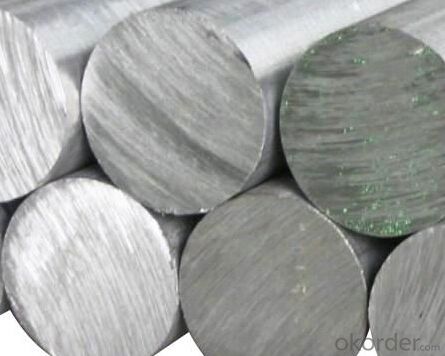
- Q: How does special steel contribute to the aerospace aftermarket industry?
- The aerospace aftermarket industry heavily relies on special steel to provide critical components that are vital for the safe and efficient operation of aircraft. Special steel possesses high strength, durability, and temperature resistance, making it an ideal material for a wide range of aerospace applications. Engine components are primarily manufactured using special steel, particularly nickel-based superalloys. These alloys are used to produce turbine blades, compressor discs, and shafts, which are essential elements of jet engines. These components must be able to withstand extreme temperatures, pressures, and mechanical stresses, and special steel alloys offer the necessary properties to ensure reliable and long-lasting performance. Special steel is also utilized in the production of structural components in aircraft. Steel alloys with high strength-to-weight ratios, such as titanium alloys, are employed to construct critical parts like landing gear, wing spars, and fuselage frames. These components need to be lightweight yet strong enough to endure the forces and stresses experienced during flight. Special steel alloys provide the required mechanical properties to ensure the structural integrity and safety of the aircraft. In addition to engine and structural components, special steel is crucial for the production of fasteners, bearings, and other small but vital parts. These components play a significant role in holding various parts together and ensuring the proper functioning of systems. Special steel alloys with exceptional corrosion resistance, fatigue strength, and wear resistance are used to guarantee the reliability and longevity of these critical components. Furthermore, special steel plays a vital role in the maintenance, repair, and overhaul (MRO) activities of the aerospace aftermarket industry. Due to the rigorous demands placed on aircraft components, regular inspections, repairs, and replacements are necessary to maintain their airworthiness. Special steel materials are commonly used for MRO purposes because they are compatible with existing aircraft systems and can meet the stringent requirements of aerospace regulations. Overall, special steel is an indispensable material in the aerospace aftermarket industry. Its unique properties and characteristics enable the production of high-performance engine components, lightweight structural parts, and reliable small components. The use of special steel ensures the safety, efficiency, and longevity of aircraft, contributing to the overall success and growth of the aerospace aftermarket industry.
- Q: How does special steel perform in extreme heat conditions?
- Special steel is specifically designed to perform exceptionally well in extreme heat conditions. It exhibits high resistance to thermal fatigue, oxidation, and creep, making it suitable for applications that involve exposure to intense heat. The unique composition and processing techniques used in the production of special steel allow it to retain its mechanical properties and structural integrity even at elevated temperatures. One of the key characteristics of special steel is its high melting point, which prevents it from melting or deforming easily under extreme heat. This property is crucial in industries such as aerospace, power generation, and automotive, where components are subjected to intense heat and need to maintain their shape and functionality. Furthermore, special steel possesses excellent heat resistance, meaning it can withstand and dissipate heat effectively without losing its strength or becoming brittle. This property ensures that the steel remains durable and reliable even when exposed to prolonged high-temperature environments. Special steel also exhibits outstanding oxidation resistance, forming a protective layer on its surface that prevents it from corroding or degrading when exposed to oxygen at high temperatures. This resistance to oxidation allows special steel to maintain its performance and structural integrity over extended periods, making it highly suitable for applications in extreme heat conditions. In summary, special steel performs exceptionally well in extreme heat conditions due to its high melting point, heat resistance, and oxidation resistance. Its ability to withstand thermal fatigue, oxidation, and creep makes it a reliable and durable choice for applications that require superior performance in high-temperature environments.
- Q: What are the cost implications of using special steel?
- The cost implications of using special steel can vary depending on several factors. Special steel generally refers to alloyed or high-grade steel that offers enhanced properties such as improved strength, corrosion resistance, or heat resistance. One of the main cost implications is the higher initial cost of special steel compared to regular carbon steel. Special steel often requires more complex and expensive production processes, which can drive up the cost of raw materials. Additionally, the limited availability of certain alloying elements used in special steel can further increase its price. However, using special steel can also lead to cost savings in the long run. Its improved properties can result in reduced maintenance and replacement costs. For example, special steel that offers better corrosion resistance may require less frequent painting or coating, saving on maintenance expenses. Similarly, using high-strength special steel can allow for the use of lighter and thinner components, reducing material costs and transportation expenses. Furthermore, special steel's enhanced performance characteristics can lead to improved product quality and durability, which may result in higher customer satisfaction, increased sales, and potentially higher profits. In summary, while the initial cost of special steel is usually higher, its long-term benefits in terms of improved performance, reduced maintenance, and potential sales growth can offset these expenses, making it a cost-effective choice in many applications.
- Q: What are the advantages of using special steel in the renewable energy sector?
- Using special steel in the renewable energy sector offers several advantages. Firstly, special steel provides exceptional strength and durability, making it ideal for constructing large-scale renewable energy infrastructure such as wind turbines and solar panel frameworks. This ensures the longevity and reliability of these structures, even in harsh environmental conditions. Secondly, special steel has excellent corrosion resistance, which is crucial in renewable energy projects located near coastal areas or in offshore installations. It helps to protect the equipment from the corrosive effects of saltwater, extending the lifespan of the components and reducing maintenance costs. Additionally, special steel offers excellent heat resistance properties, making it suitable for concentrated solar power systems or thermal energy storage devices. It can withstand high temperatures without deformation or loss of strength, ensuring safe and efficient operation in these applications. Overall, the use of special steel in the renewable energy sector provides enhanced structural integrity, corrosion resistance, and heat resistance, contributing to the long-term reliability and performance of renewable energy infrastructure.
- Q: What are the requirements for special steel used in railway applications?
- Due to the demanding nature of the industry, the railway sector has stringent requirements for the special steel it uses. Here are a few key considerations: 1. Strength and durability are of utmost importance. The steel must possess exceptional strength and durability to withstand the heavy loads and constant vibrations experienced by trains. This is crucial in preventing deformation, fatigue, and failure of steel components. 2. Wear resistance is another vital requirement. The constant movement of trains subjects railway tracks and other components to significant wear and tear. Therefore, the special steel used in railway applications should have good wear resistance. This ensures a longer service life and reduces maintenance costs. 3. Corrosion resistance is imperative due to exposure to various environmental conditions, such as rain, snow, and chemicals. The special steel must possess high corrosion resistance to prevent rusting and degradation. This ensures the longevity of the components. 4. Fatigue resistance is crucial since trains undergo repetitive loading cycles that can lead to fatigue in steel components. Special steel with excellent fatigue resistance is necessary to prevent cracking and failure. This ensures the safety and reliability of railway systems. 5. High impact toughness is essential. Special steel used in railway applications must absorb energy during sudden shocks or accidents. This prevents catastrophic failures and ensures the safety of passengers and railway personnel. 6. Heat resistance is a requirement for certain railway applications, especially high-speed trains. The steel components are exposed to high temperatures due to friction or other sources. Special steel should possess good heat resistance to maintain its mechanical properties and structural integrity even under elevated temperatures. 7. Dimensional stability is crucial to maintain the required tolerances and alignment of various components in railway applications. Special steel should exhibit excellent dimensional stability. This ensures smooth operation, reduces noise, and prevents excessive wear. These are the primary requirements for special steel used in railway applications. Meeting these requirements is crucial for the safe, reliable, and efficient operation of railway systems.
- Q: Can special steel be used for nuclear power plant components?
- Yes, special steel can be used for nuclear power plant components. Special steel alloys, such as stainless steel or low alloy steel, are commonly used in the construction of various components in nuclear power plants due to their high strength, corrosion resistance, and ability to withstand high temperatures and radiation exposure. These properties are crucial for ensuring the safety and longevity of nuclear power plants.
- Q: What are the main characteristics of wear-resistant castings?
- Wear-resistant castings are specifically designed to withstand the harsh conditions of wear and abrasion. The main characteristics of these castings include: 1. Hardness: Wear-resistant castings are made from materials that have a high hardness rating. This allows them to resist deformation, surface damage, and wear caused by friction and impact. 2. Toughness: In addition to being hard, wear-resistant castings also possess high toughness. This means they can absorb energy without fracturing or breaking, ensuring their longevity and durability in challenging environments. 3. Corrosion resistance: Wear-resistant castings are often resistant to corrosion and oxidation, which helps to extend their lifespan and maintain their performance even in corrosive or high-temperature conditions. 4. Heat resistance: These castings can withstand high temperatures without losing their hardness or strength, making them suitable for applications where heat is generated or transferred, such as in industrial machinery or power plants. 5. Wear resistance: As the name suggests, the primary characteristic of wear-resistant castings is their ability to resist wear. They are designed to minimize the loss of material due to abrasion, erosion, or friction, ensuring a longer lifespan and reduced maintenance requirements. 6. Customizability: Wear-resistant castings can be customized to suit specific applications and requirements. They can be produced in various shapes, sizes, and configurations to fit different components and machinery, providing tailored solutions for wear-related challenges. Overall, the main characteristics of wear-resistant castings make them essential components in industries where wear and abrasion are prevalent, such as mining, construction, cement, and steel manufacturing. These castings help to increase the lifespan and reliability of equipment, reduce downtime, and improve overall operational efficiency.
- Q: What are the main characteristics of structural steel forgings?
- Structural steel forgings offer numerous advantageous qualities that make them highly suitable for a wide range of construction and engineering purposes. To begin with, the outstanding strength and durability of structural steel forgings are among their main attributes. Steel possesses remarkable tensile strength, allowing it to bear heavy loads and withstand stress-induced deformations. This makes structural steel forgings ideal for supporting large structures and withstanding dynamic forces such as wind or seismic activity. Another noteworthy quality is the versatility of structural steel forgings. Steel can be shaped and sized into a diverse array of forms, making it adaptable to various design requirements. It can be forged into intricate and complex shapes, enabling the creation of precise and customized components. This versatility enables the application of structural steel forgings in a multitude of scenarios, ranging from beams and columns in buildings to bridges and offshore structures. Moreover, structural steel forgings exhibit excellent weldability. Various welding techniques can be employed to easily join steel components together, creating robust and dependable connections. This enhances the overall structural integrity and longevity of steel elements. One more key characteristic of structural steel forgings is their cost-effectiveness. Steel is an economical construction material due to its abundance, recyclability, and ease of manufacturing. The production process for steel forgings is efficient and can be scaled up to meet the demands of large-scale construction projects. Consequently, it represents a cost-effective choice for numerous applications. Furthermore, structural steel forgings are renowned for their resistance to corrosion. Steel can be treated with coatings or alloys to enhance its resistance against rust and other forms of corrosion. This makes it highly suitable for deployment in environments with high humidity, exposure to saltwater, or harsh weather conditions. In conclusion, the exceptional strength, versatility, weldability, cost-effectiveness, and resistance to corrosion are the primary characteristics of structural steel forgings. These qualities position structural steel forgings as the preferred choice for a multitude of construction and engineering applications, offering durability, reliability, and longevity to structures.
- Q: How does special steel contribute to the transportation industry?
- Special steel plays a crucial role in the transportation industry by providing strength, durability, and reliability to various components and structures. It is used in the construction of vehicle bodies, engines, chassis, and suspension systems, ensuring safety and longevity. Additionally, special steel's high resistance to corrosion and fatigue helps extend the lifespan of transportation equipment, reducing maintenance costs and enhancing efficiency. Overall, special steel enhances the performance, efficiency, and safety of vehicles, making it an invaluable material in the transportation industry.
- Q: What is the role of research and development in advancing special steel technology?
- The role of research and development in advancing special steel technology is crucial. Through continuous research and development efforts, new and improved manufacturing processes, alloys, and applications for special steel can be discovered and developed. This leads to advancements in the properties and performance of special steel, making it more durable, resistant to wear and corrosion, and capable of meeting the evolving needs of industries such as automotive, aerospace, and energy. Additionally, research and development help in optimizing production techniques, reducing costs, and promoting sustainability in the special steel industry. Overall, research and development play a vital role in pushing the boundaries of special steel technology, enabling innovation and driving progress in various sectors.
Send your message to us
High Heavy and High Quality Bearing Steel GCr15
- Loading Port:
- China Main Port
- Payment Terms:
- TT or LC
- Min Order Qty:
- -
- Supply Capability:
- -
OKorder Service Pledge
OKorder Financial Service
Similar products
Hot products
Hot Searches
Related keywords
